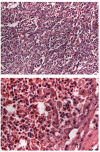Severe paraneoplastic hypereosinophilia in metastatic renal cell carcinoma
- PMID: 22436420
- PMCID: PMC3348004
- DOI: 10.1186/1471-2490-12-7
Severe paraneoplastic hypereosinophilia in metastatic renal cell carcinoma
Abstract
Background: Renal cell carcinoma can cause various paraneoplastic syndromes including metabolic and hematologic disturbances. Paraneoplastic hypereosinophilia has been reported in a variety of hematologic and solid tumors. We present the first case in the literature of severe paraneoplastic hypereosinophilia in a patient with renal cell carcinoma.
Case presentation: A 46 year-old patient patient with a history of significant weight loss, reduced general state of health and coughing underwent radical nephrectomy for metastasized renal cell carcinoma. Three weeks after surgery, the patient presented with excessive peripheral hypereosinophilia leading to profound neurological symptoms due to cerebral microinfarction. Systemic treatment with prednisolone, hydroxyurea, vincristine, cytarabine, temsirolimus and sunitinib led to reduction of peripheral eosinophils but could not prevent rapid disease progression of the patient. At time of severe leukocytosis, a considerable increase of cytokines associated with hypereosinophilia was measurable.
Conclusions: Paraneoplastic hypereosinophilia in patients with renal cell carcinoma might indicate poor prognosis and rapid disease progression. Myelosuppressive therapy is required in symptomatic patients.
Figures






References
-
- Da Silva JL, Lacombe C, Bruneval P, Casadevall N, Leporrier M, Camilleri JP, Bariety J, Tambourin P, Varet B. Tumor cells are the site of erythropoietin synthesis in human renal cancers associated with polycythemia. Blood. 1990;75:577–582. - PubMed
Publication types
MeSH terms
LinkOut - more resources
Full Text Sources
Medical

